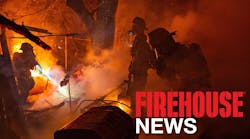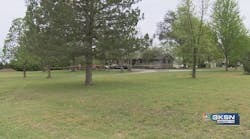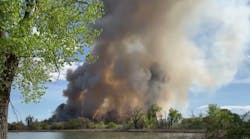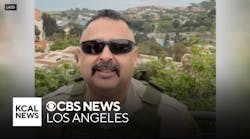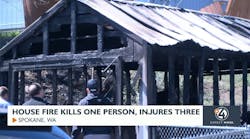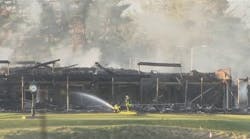Kelvin Cochran was appointed administrator for the Federal Emergency Management Agency's (FEMA) U.S. Fire Administration (USFA) on Aug. 27, 2009. Cochran has 28 years of experience in preventing and responding to fires and emergencies, including firefighting, EMS, hazardous materials, public education, and research and development. His administrative expertise includes personnel management, training and strategic planning. Before joining FEMA, Cochran was chief of the Atlanta, GA, Fire Rescue Department, where he coordinated homeland security and emergency preparedness initiatives between the City of Atlanta and the Atlanta Fulton County Emergency Management Agency (AFCEMA). Previously, he served in the Shreveport, LA, Fire Department as a firefighter, assistant chief training officer and fire chief. Cochran also served as president of the Metropolitan Fire Chiefs Association and first vice president of the International Association of Fire Chiefs (IAFC). The interview was conducted by Firehouse® Contributing Editor Charles L. Werner, chief of the Charlottesville, VA, Fire Department.
FIREHOUSE: Your career has been a very distinguished one and as you have served as fire chiefs for Shreveport, LA, and Atlanta, GA, and as the International Association of Fire Chiefs (IAFC) first vice president, can you first tell how each of these waypoints influenced your career?
COCHRAN: From the very beginning, since my recruit academy experience, I have been driven to do my best to try to make a difference in the fire service. What I realized is to really make a difference in serving people through the fire service requires advancement and promotion throughout your career. I have always heard, "success is where preparation meets opportunity," so I had the mindset of continually being in a steady state of preparation through training and education.
Professional development has always been a major focus of my career development to prepare me for advancement and promotional opportunities. When I realized being promoted from firefighter to training officer that I could serve more and make a better difference, I had a greater hunger to serve at a higher level. I was promoted to assistant chief training officer and began to see what a difference it made, consequently, successfully competing to serve as the fire chief of Shreveport. That opportunity was made possible because of the preparation I had diligently applied over those years. As fire chief of Shreveport, everything was going super. We were accomplishing great things. I continued to serve and prepare. Ultimately, the opportunity in the City of Atlanta came along.
While serving as fire chief in Shreveport, I became the president of the Metropolitan Fire Chiefs Association and ultimately ran and was successfully elected to second vice president of the IAFC. At the time of my accepting the appointment as fire chief in Atlanta, I was serving as first vice president of the IAFC. To recap, having a desire to serve more people at greater levels and having a mindset of a constant state of preparation has created the opportunity where I get to serve now, the American people and the American fire service as the United States Fire Administrator.
FIREHOUSE: While serving as fire chief in Shreveport and Atlanta, what successes were you most proud of and why?
COCHRAN: In the City of Shreveport, it was a great time economically for the city and we had tremendous community and political support built up through the years by my predecessors. I came in at a great time. We had many great accomplishments from increased salary/benefits to members, adding and renovating fire stations, increasing the number of medic units from eight to 10, and improving the capabilities of our emergency medical services through increasing the number of paramedics and the skills that they provide saving lives. The two that I am most proud of in spite of all those tremendous accomplishments, we had two years in a row (2006, 2007) where there were zero civilian fire deaths. During my nine-year tenure as fire chief in the City of Shreveport, we did not lose a firefighter in the line of duty and we did not have a major debilitating injury to a firefighter.
In the City of Atlanta, I experienced a completely different set of circumstances. From the time of my arrival, we were (I think) the first major city to be impacted by the economic downturn. Tremendous budget challenges (included) closing Fire Station 7, eliminating a heavy rescue truck, abolishing 120 sworn positions and laying off about 15 civilians and 27 firefighters, brownouts, blackouts; you name it, it was a very dark time as far as getting accomplishments that fire chiefs have been able to tout for years like those that I experienced in Shreveport. They just didn't happen in Atlanta the 20 months I was there. Nevertheless, and in spite of all those challenges, I do tout and am very proud of the fact that to get through all of that we had tremendous unified leadership effort by the middle- and upper-level managers of the Atlanta Fire Rescue Department with input from Local 134 Brothers Combined and other younger members in the department who did not really have any rank. We all worked together as leaders to get our fire department through this difficult time.
On the heels of all these challenges, we were simultaneously engaged in a tremendous public information and public education campaign through neighborhood associations and neighborhood planning units and with the media. Now, the City of Atlanta is a better-informed and better-educated public about the operations of the Atlanta Fire Rescue Department and the impact of not being adequately funded so much that I believe it will be very high on the political agenda for the upcoming mayor's race to restore to the Atlanta Fire Rescue Department the things that have been lost. The community and the elected support are tremendous because of how we communicated and educated the public during that tremendous downturn in the economy and the impact on the City of Atlanta.
FIREHOUSE: Your election to IAFC second vice president had established your path to become the IAFC president this year. Your decision to take the Atlanta fire chief position and no longer pursue the IAFC role must have been difficult. Can you talk about your decision process and the factors that helped you make that decision?
COCHRAN: Being a person of Christian faith, one of the things that I did a lot in that hard decision process was to pray about it. Then, the second thing that I did was to talk with my wife and family. I've always believed that any opportunities that come our way for advancement, it's truly God leading you to another rung toward your destiny. It also includes being able to take care of and sustaining your family and that your family will never suffer as a result of your promotion or advancement in your profession. After talking to God and Carolyn, I just knew it was the right thing to do.
Giving up the advancement to the president of the IAFC; I had a lot of reservations because it is a rare opportunity for fire service leaders to serve the international fire service leader association. Strangely enough, I just had some comfort that there were going to be other opportunities that would allow me to serve the nation at that level somehow, some way. And in my limited way to forecast that I was just thinking, after Chief Luther Fincher serves out his term on the IAFC Executive Board, that I would pursue the Metro Chiefs representative to the IAFC Board and that would be a way that I could serve. Then, hopefully, around 2011–2012, I would get to run for second vice president again. Out of nowhere, the opportunity to serve as United States Fire Administrator came along and it really fulfills and exceeds the desire I had to serve at the national level.
FIREHOUSE: You are well known as an inspiring leader and your keynote at the 2009 Fire Rescue International conference ("Becoming Fully Involved") was very focused, stimulating and engaging. Explain briefly why this message and the timing of it are so important.
COCHRAN: The United States of America is in a state where tough times for all Americans is the new normal. We have not gone through a period like this since the Great Depression. However, we have a history of being a nation of overcomers and there are so many milestones in our past where we were faced with great challenges as a nation. We have overcome every last one of them.
We are going to be in this for at least the next three years and as fire service leaders we cannot wait for times to get better or for the world to change; we have to become "world changers." Our focus should be as world changers. The part that we play in our communities and the leadership roles that we have in our fire service organizations, whether it is local, state or federal; we all have a part to play. Thought one person can make a difference, we cannot do it alone. The leaders of the fire service organizations, no matter how influential or powerful they may be, cannot do it alone. It takes everyone in every organization becoming "fully involved" from the firefighter to the fire chief to the IAFC president to the president of the IAFF (International Association of Fire Fighters) and even the United States Fire Administrator. We all have to become "fully involved" and that is to rely on the legacy of hope, optimism and resilience we all have inherited from our forefathers and parents who have gone through those tremendous times of our past.
Now more than ever before, we must rely on the fire and passion that we have on the inside of us for what we do for a living as firefighters and focus on the faith and optimism we have toward the future. "Things are going to get better." We have to begin to celebrate the good things going on daily and be grateful for the things that we have. We must be inspiring and encouraging as leaders to keep everyone fully engaged so that when things do get better, the celebration will be even greater.
FIREHOUSE: Tell what it was like when you were asked to serve as the new U.S. Fire Administrator.
COCHRAN:I was filled with mixed emotions and a lot of uncertainty because at that point, 18 months into my service in Atlanta, I felt this tremendous sense of obligation to stick it out. I felt that I would be letting the City of Atlanta, the mayor, Shirley Franklin, and the men and women of Atlanta Fire Rescue down if I would just spend 18 months there and be off again. I had said before that opportunity even came along when people asked me if I was there seeking other opportunities, no, that I am here for the long haul and the last thing that the Atlanta Fire Rescue needs now is a vacancy in the fire chief's position and to go through another long period where the department has an interim fire chief.
My words had convicted me and I was wholeheartedly committed to hanging in there with the City of Atlanta and had every intention of saying no and turning the USFA position down. But, based on my faith, I had to pray and talk to my wife again. I also talked to community leaders in the City of Atlanta whom I respected a lot. The response from those persons was consistently the same — "there is no way you can turn this down." They would say, "Your feelings toward the City of Atlanta and sticking it through are quite honorable, but you cannot pass this up and everybody will understand." I said yes. Everything worked out and here I am today.
FIREHOUSE: As the U.S. Fire Administrator, what are your vision and main goals during this administration and how can we as a fire service assist?
COCHRAN: I would like to quote something that our FEMA Administrator, Craig Fugate, who is very inclusive and passionate about the role of the American fire service, said at the IAFC Conference in Dallas. Administrator Fugate said that he wants me to put the "fire" back in the United States Fire Administration. Administrator Fugate wants to see the USFA play a more assertive/aggressive role in taking the lead for national-level issues that affect the national fire service. I share that philosophy wholeheartedly. I just did not come up with the words to describe it as passionately as Administrator Fugate has.
First, we have to focus on why the USFA was established in the first place, which was to address the fire problem in the United States. There is a document that we talk about quite often, America Burning, and a recap on progress called America Burning Revisited. I think one of the first initiatives to commit to as U.S. Fire Administrator is to evaluate the performance of the USFA towards pursuing the recommendations set forth in America Burning and America Burning Revisited. Once we identify our successes, we should report it nationally to all of our stakeholders and identify areas where we have not been assertive or aggressive enough. Then revise or create new programs to demonstrate the level of assertiveness/aggressiveness necessary to reduce property loss, to reduce loss of civilian lives and injuries to civilians.
We need to be more focused on high-risk groups, children below the age of 5, adults above the age of 50 and minority communities that are low income, on the bottom end of the socioeconomic scale. There are some communities that fit that description, but do not have the resources for fire prevention and life safety programs. We as the federal government should provide non-competitive grants to those communities and those fire departments that have a focus on fire prevention and life safety that further reduce deaths and property losses in those communities. I also believe that the USFA should play a more assertive role with our fire service stakeholders who are pursuing legislation and codes for residential sprinklers; even though it has been done in some areas, it is a tough fight. In many other areas, we should partner with homeowner and homebuilder associations where we can find meaningful ways to move residential sprinklers legislation and installation to more of a reality.
The next thing (not in any rank order) and one of the most important things that we as the USFA must do more aggressively is to pursue more substantive efforts towards reducing LODDS (line-of-duty deaths) to firefighters. We have experienced a tremendous reduction of civilian deaths and injuries since America Burning and since the USFA was born, but the statistics relative to firefighter LODDs and injuries are essentially unchanged. That is above 100 firefighter line-of-duty deaths and over 100,000 injuries per year. We are experiencing an unusual anomaly at this point where we are just above 70 LODDs for this year. If the rate stays the same, we will fortunately fall below 100 for the first time in over seven years. Hopefully, we will be able to continue this trend for many years to come. At this time, there is no way to analyze and determine if all of our efforts for the past 20-plus years are now starting to pay off or is just an anomaly. I believe it is an anomaly because there are too many other things that we can evaluate that we know culturally are not changing.
Having said that, I am going to initiate an effort from the USFA of developing a vulnerability self-assessment tool similar to applications such as the accreditation model, but focuses on identifying risks and vulnerabilities specifically related to injuries and deaths. This then puts fire chiefs and communities in a situation where they can actually identify the local risks and develop strategic and operational plans for overcoming those risks. We don't have anything like that right now and I think that will make a difference long term to reduce LODDs and injuries.
Preparedness and response. There is an expectation that the USFA will be the nation's leader for the deployment of the American fire service in the event of a national disaster. The IAFC and other stakeholders have worked very hard to develop plans for such a deployment if it's needed toward natural or manmade disasters, but I am not convinced that we are at a point to where we understand at the local, regional, state or federal level how that deployment procedure will manifest itself and how it will unfold under the practical scenarios according to those 16 scenarios in the NRF (National Response Framework).
As Fire Administrator, I am not going to wait for a big disaster before addressing this issue. I am going to engage our fire service stakeholders in detailing the sequence of a deployment strategy for the 16 scenarios and how we will actually mobilize local fire departments to become a national asset during times of national natural or manmade disasters.
Two other things in our emergency preparedness responsibility, the Emergency Support Function (ESF) 4 function (Firefighting Annex) is primarily led by the U.S. Forest Service. I believe the USFA should play, at the very least, an equal role as a partner in leadership in ESF 4 at the federal level. I am going to evaluate the USFA's role and where necessary pursue a more formal leadership role in ESF 4. While we have large wildland fires, the vast majority of incidents in those 16 national scenarios in the NRF does not require wildland fire capability; they require capabilities that are provided through career/combination/volunteer fire services, special operations and hazmat operations that are provided by fire services. To have the U.S. Forest Service as the primary leader in ESF 4 when disasters don't call for wildland fire capabilities is out of place. We are going to assert ourselves as a leader in those scenarios where wildland fire is not the target capabilities that the fire service brings to the table.
Another very important issue is the evaluation of the impacts (not the outcomes) of the Assistance to Firefighter Grants and the SAFER Grants. We have eight years now of these grants that have tremendously benefited fire departments (career, combination and volunteer) and at this stage questions have already begun to be asked if these grants have really made a difference. From our side of the USFA and the American fire service, we really do not have a valid objective response to those questions. We know that they are making a difference, but that is not good enough. We need the proof. We have to conduct an assessment of the impacts that demonstrate statistically and scientifically that citizens and firefighters are safer. We must show whether these programs are actually reducing property loss, saving citizens' lives, reducing injuries to civilians, reducing deaths and injuries to firefighters, and increasing capabilities at the local level that ultimately increase our capabilities at the federal level for response to natural and manmade disasters. By doing this, we silence all the naysayers and critics who are not convinced that these federal dollars are being put to good use. Also, we strengthen the credibility and viability of federal grant programs for the future.
FIREHOUSE: Looking back, what would you like to say about/to the people that you have worked with and what role they played in your career?
COCHRAN: From my childhood up to now, I can think of people who have made a difference and have encouraged me directly or indirectly to pursue my dreams. As a 5-year-old kid, seeing a fire across the street from where I lived, really planted the dream to become a firefighter when I grew up. Stories from people who would tell me if you want your dream to come true, you have to believe in God, get a good education, respect grown people, treat other's children like you want to be treated. Those values really led me to where I am today. Actually, having people along the way such as teachers, grandparents, people in the neighborhood, friends, colleagues that I looked up to and admired along the way that encouraged me really had an impact.
My fire service career started from the time I was in the recruit academy. The training officers were so impressive and inspiring; they caused me to want to become a training officer one day. Becoming a training officer and observing a lot closer the leadership of fire chiefs and the chief training officer inspired me to want to reach higher. I always had positive role models in the fire service that I was blessed to interact with. Observing their leadership impact, where they were and how they served made me feel like I could be like them. I pursued my dream to follow in their footsteps. It has proved to be beneficial and fulfilling.
A final note: Administrator Cochran leaves us with the thought that we need more face-to-face dialogue where fire service leaders get together to encourage and inspire one another. Meaningful conferences with fire service organizations where we talk about the real issues and what we intend to do about them will strengthen us and make us more encouraged and inspired. Perhaps it is time for an old-fashioned national fire service revival.
Administrator Cochran believes the concept of a song learned as a child applies to building and strengthening fire service relationships and strengthening us through tough times, "The More We Get Together, The Happier We Will Be." His inspiring presentation, "Becoming FULLY INVOLVED," can be viewed online at IAFC-TV, http://www.tvworldwide.com/events/iafc/090825/default.cfm?id=11477&type=wmhigh&test=0.
CHARLES L. WERNER, a Firehouse® contributing editor, is a 34-year veteran of the fire service and chief of the Charlottesville, VA, Fire Department. He serves on the Virginia Statewide Interoperability Executive Committee, Virginia Secure Commonwealth Panel, National Public Safety Telecommunications Council Governing Board and IAFC Communications Committee. Werner is chair of the IAFC Technology Council, first vice president of the Virginia Fire Chiefs Association and chair of the DHS SAFECOM Executive Committee.
